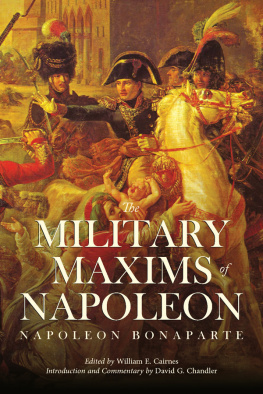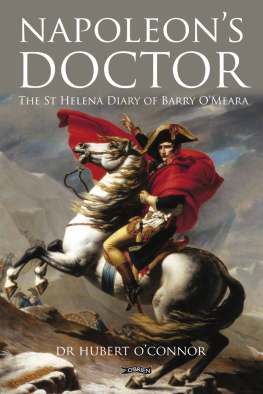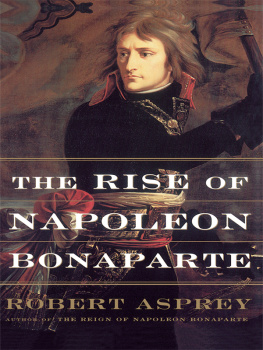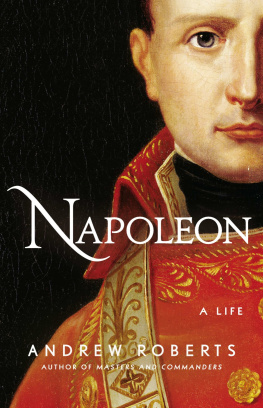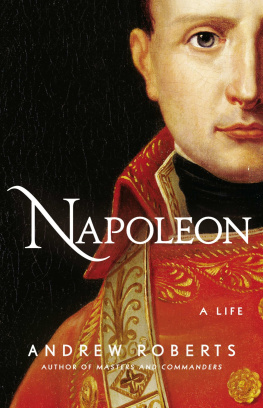PREFACE
I have no apology to offer for the subject of this book, in view of Lord Rosebery's testimony that, until recently, we knew nothing about Napoleon, and even now "prefer to drink at any other source than the original."
"Study of Napoleon's utterances, apart from any attempt to discover the secret of his prodigious exploits, cannot be considered as lost time." It is then absolutely necessary that we should, in the words of an eminent but unsympathetic divine, know something of the "domestic side of the monster," first hand from his own correspondence, confirmed or corrected by contemporaries. There is no master mind that we can less afford to be ignorant of. To know more of the doings of Pericles and Aspasia, of the two Csars and the Serpent of old Nile, of Mary Stuart and Rizzio, of the Green Faction and the Blue, of Orsini and Colonna, than of the Bonapartes and Beauharnais, is worthy of a student of folklore rather than of history.
Napoleon was not only a King of Kings, he was a King of Words and of Facts, which "are the sons of heaven, while words are the daughters of earth," and whose progeny, the Genii of the Code, still dominates Christendom. In the hurly-burly of the French War, on the chilling morrow of its balance-sheet, in the Janus alliance of the Second Empire, we could not get rid of the nightmare of the Great Shadow. Most modern works on the Napoleonic period (Lord Rosebery's "Last Phase" being a brilliant exception) seem to be (1) too long, (2) too little confined to contemporary sources. The first fault, especially if merely discursive enthusiasm, is excusable, the latter pernicious, for, as Dr. Johnson says of Robertson, "You are sure he does not know the people whom he paints, so you cannot suppose a likeness. Characters should never be given by a historian unless he knew the people whom he describes, or copies from those who knew him."
Now, if ever, we must fix and crystallise the life-work of Napoleon for posterity, for "when an opinion has once become popular, very few are willing to oppose it. Idleness is more willing to credit than inquire ... and he that writes merely for sale is tempted to court purchasers by flattering the prejudices of the public."
H. F. HALL.
INTRODUCTION
Difficulties of translationNapoleon as lexicographer and bookwormHistoric value of his BulletinsA few aspects of Napoleon's character"Approfondissez!"The need of a CreatorThe influence of sea powerEngland's future rival-Napoleon as average adjusterHis use of FreemasonryOf the Catholics and of the JewsHis neglect of women in politicsJosephine a failureHis incessant work, "which knew no rest save change of occupation"His attachment to early friendshipsThe Bonaparte familyHis influence on literary menConversations with Wieland and MllerVerdict of a British tarThe character of JosephineSources of the LettersThe Tennant CollectionThe Didot CollectionArchibald Constable and Sir Walter ScottCorrespondence of Napoleon I.Report of the CommissionContemporary sourcesThe DiaryNapoleon's heritage.
Napoleon is by no means an easy writer to translate adequately. He had always a terse, concise mode of speaking, and this, with the constant habit of dictating, became accentuated. Whenever he could use a short, compact word he did so. The greatest temptation has been to render his very modern ideas by modern colloquialisms. Occasionally, where Murray's Dictionary proves that the word was in vogue a century ago, we have used a somewhat rarer word than Napoleon's equivalent, as e.g. "coolth," in Letter No. 6, Series B (pendant le frais), in order to preserve as far as possible the brevity and crispness of the original. Napoleon's vocabulary was not specially wide, but always exact. In expletive it was extensive and peculiar. Judging his brother by himself, he did not consider Lucien sufficient of a purist in French literature to write epics; and the same remark would have been partly true of the Emperor, who, however, was always at considerable pains to verify any word of which he did not know the exact meaning. His own appetite for literature was enormous, especially during the year's garrison life he spent at Valence, where he read and re-read the contents of a bouquiniste's shop, and, what is more, remembered them, so much so that, nearly a quarter of a century later, he was able to correct the dates of ecclesiastical experts at Erfurt. Whatever he says or whatever he writes, one always finds a specific gravity of stark, staring facts altogether abnormal. For generations it was the fashion to consider "as false as a bulletin" peculiar to Napoleon's despatches; but the publication of Napoleon's correspondence, by order of Napoleon III., has changed all that. In the first place, as to dates. Not only have Haydn, Woodward and Cates, and the Encyclopdia Britannica made mistakes during this period, but even the Biographie Universelle (usually so careful) is not immaculate. Secondly, with regard to the descriptions of the battles. We have never found one that in accuracy and truthfulness would not compare to conspicuous advantage with some of those with which we were only too familiar in December 1899. Napoleon was sometimes 1200 miles away from home; he had to gauge the effect of his bulletins from one end to the other of the largest effective empire that the world has ever seen, and, like Dr. Johnson in Fleet Street reporting Parliamentary debates (but with a hundred times more reason), he was determined not to let the other dogs have the best of it. The notes on the battles of Eylau (Series H) and Essling (Series L), the two most conspicuous examples of where it was necessary to colour the bulletins, will show what is meant. Carlyle was the first to point out that his despatches are as instinct with genius as his conquestshis very words have "Austerlitz battles" in them. The reference to "General Danube," in 1809, as the best general the Austrians had, was one of those flashes of inspiration which military writers, from Napoleon to Lord Wolseley, have shown to be a determining factor in every doubtful fray.
"Approfondissezgo to the bottom of things," wrote Lord Chesterfield; and this might have been the life-motto of the Emperor. But to adopt this fundamental common-sense with regard to the character of Napoleon is almost impossible; it is, to use the metaphor of Lord Rosebery, like trying to span a mountain with a tape. We can but indicate a few leading features. In the first place, he had, like the great Stagirite, an eye at once telescopic and microscopic. Beyond the mcanique cleste, beyond the nebulous reign of chaos and old night, his ken pierced the primal truththe need of a Creator: "not every one can be an atheist who wishes it." No man saw deeper into the causes of things. The influence of sea power on history, to take one example, was never absent from his thoughts. Slowly and laboriously he built and rebuilt his fleets, only to fall into the hands of his "Punic" rival. Beaten at sea, he has but two weapons left against Englandto "conquer her by land," or to stir up a maritime rival who will sooner or later avenge him. We have the Emperor Alexander's testimony from the merchants of Manchester, Birmingham, and Liverpool how nearly his Continental System had ruined us. The rival raised up beyond the western waves by the astute sale of Louisiana is still growing. In less than a decade Napoleon had a first crumb of comfort (when such crumbs were rare) in hearing of the victories of the



